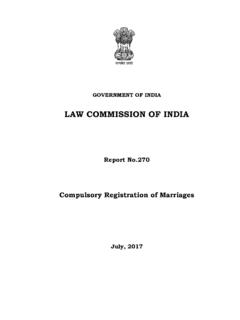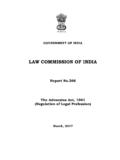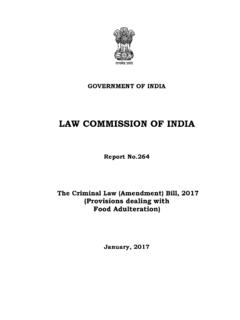Transcription of Consultation Paper-cum-Questionnaire on …
1 Consultation Paper-cum-Questionnaire onAdverse possession of Land/Immovable PropertyThe claim to rights and interests in relation to property on the basis of possession has been recognized in all legal systems. Uninterrupted and uncontested possession for a specified period, hostile to the rights and interests of true owner, is considered to be one of the legally recognized modes of acquisition of ownership. The prescription of periods of limitations for recovering possession or for negation of the rights and interests of true owner is the core and essence of the law of adverse possession . Right to access to Courts is barred by law on effluxion of prescribed time. The conditions necessary for the acceptance of a claim based on adverse possession have been laid down basically by way of Judge-made law. Several exceptions to the concept of adverse possession based on legal relationship between the title holder and the person in actual possession as well as the character of land are also recognized by law.
2 Permissive possession or possession without a clear intention to exercise exclusive rights over the property is not considered as adverse legal position and principles governing adverse observed by the Supreme Court of India in the case of Karnataka Board of Wakf Vs. GOI1, in the eye of law, an owner would be deemed to be in possession of a property so long as there is no intrusion. Non-use of the property by the owner even for a long time won t affect his title. But the position will be altered when another person takes possession of the property and asserts rights over it and the person having title omits or neglects to take legal action against such person for years together( emphasis supplied). The process of acquisition of title by adverse possession springs into action essentially by default or inaction of the owner .2 The 1( 2004) 10 SCC 7792 Amrendra Pratap Singh vs. Tej Bahadur Prajapati, (2004) 10 SCC 65essential requisites to establish adverse possession are that the possession of the adverse possessor must be neither by force nor by stealth nor under the license of the owner.
3 It must be adequate in continuity, in publicity and in extent to show that the possession is adverse to the paper owner. law on adverse possession is contained in the Indian Limitation Act. Article 65, Schedule I of The Limitation Act prescribes a limitation of 12 years for a suit for possession of immovable property or any interest therein based on title. It is important to note that the starting point of limitation of 12 years is counted from the point of time when the possession of the defendants becomes adverse to the plaintiff . Article 65 is an independent Article applicable to all suits for possession of immovable property based on title , proprietary title as distinct from possessory title. Article 64 governs suits for possession based on possessory right. 12 years from the date of dispossession is the starting point of limitation under Article 64. Article 65 as well as Article 64 shall be read with Section 27 which bears the heading Extinguishment of right to property.
4 It lays down: At the determination of the period hereby limited to any person for instituting the suit for possession of any property, his right to such property shall be extinguished. That means, where a cause of action exists to file a suit for possession and if the suit is not filed within the period of limitation prescribed, then, not only the period of limitation comes to an end, but the right based on title or possession , as the case may be, will be extinguished. The section assists the person in possession to acquire prescriptive title by adverse possession3. When the title to property of the previous owner is extinguished, it passes on to the possessor and the 3 Mitra s Law of Limitation & Prescription, 13th edition, 2011. Vol. I, revised by Justice S A Kader, right gets transformed into ownership. [Section 27] is an exception to the well accepted rule that limitation bars only the remedy and does not extinguish the title.
5 It lays down a rule of substantive law by declaring that after the lapse of the period, the title ceases to exist and not merely the remedy4. It means that since the person who had a right to possession has allowed his right to be extinguished by his inaction, he cannot recover the property from the person in adverse possession and as a necessary corollary thereto, the person in adverse possession is enabled to hold on to his possession as against the owner not in possession . As far as the Government (Central or State) property is concerned, the period of limitation for any suit (except a suit before the Supreme Court) is 30 years and the starting point of limitation is the same as in the case of a suit by a private person (vide Article 112, Schedule I of Limitation Act). Acquisition of easements by prescription is provided for by Section 25 of The Limitation legal position as regards the acquisition of title to land by adverse possession has been succinctly stated by the Judicial Committee of the Privy Council in Perry vs.
6 Clissold5: It cannot be disputed that a person in possession of land in the assumed character of owner and exercising peaceably the ordinary rights of ownership has a perfectly good title against all the world but the rightful owner. And if the rightful owner does not come forward and assert his title by the process of law within the period prescribed by the provisions of the statute of Limitation applicable to the case, his right is for ever extinguished and the possessory owner acquires an absolute title. 4 Valliamma Champaka vs Sivathanu Pillai (1964) 1 MLJ, 161 (FB)5 (1907) AC 73, at statement of law has been accepted by the Supreme Court of India in the case of Nair Service Society Ltd. vs. Alexander6. The Bench consisting of three Judges observed thus: The cases of the Judicial Committee are not binding on us. But we approve of the dictum in 1907 AC 73. No subsequent case has been brought to our notice departing from that view.
7 No doubt, a great controversy exists over the two cases of (1849) 13 QB 945 and (1865) 1 QB 1. But it must be taken to be finally resolved by 1907 AC 73. A similar view has been consistently taken in India and the amendment of the Indian Limitation Act has given approval to the proposition accepted in 1907 AC 73 and may be taken to be declaratory of the law in India. It was clarified by a three-Judge Bench of the Supreme Court in Kshitish Chandra Bose v. Commissioner of Ranchi,7 All that the law requires is that the possession must be open and without any attempt at concealment. It is not necessary that the possession must be so effective so as to bring it to the specific knowledge of the owner. Such a requirement may be insisted on where an ouster of title is pleaded, but that is not the case here. It was also clarified in a series of decisions that while possession shall be open and exclusive and in assertion of one s own right, the fact that the possessor did not know who the real owner was, will not make his possession any the less adverse .
8 There are certain passing observations in some judgments of the Supreme Court rendered by two learned Judges that the plea of adverse possession is not 6 AIR 1968 SC 11657 AIR 1981 SC 707available if the adverse possessor does not know who the true owner is; but, the law declared by the larger Bench decisions of the Supreme Court obviously prevails. intention to exclude others from the control of property is an essential element of factual possession . The intention to possess the property exclusively implies the intention to exclude all others including the true owner whether known or unknown to the adverse possessor. In an article written by Justice (retd.) Kader Law of adverse possession in India Recent Trends Unsettling the Law 8 the learned author pointed out that the attempted distinction made in Munichikkanna Reddy vs. Revamma9 between the intention to possess and intention to dispossess is not in conformity with the settled law and that both these concepts are correlative to each other.
9 The following statement of law by Slade, J on intention to possess has been approved by House of Lords in JA Pye (Oxford) Ltd. Vs. Graham10: What is really meant, in my judgment, is that the animus possidendi involves the intention, in one s own name and on one s own behalf, to exclude the world at large, including the owner with the paper title if he be not himself the possessor, so far as is reasonably practicable and so far as the processes of the law will allow. The Secretary of State vs. Vira Rayan11, a Division Bench of Madras High Court rightly pointed out that the ignorance of the owner will not prevent the accrual of a title by prescription. The possession must be open and hostile enough to be capable of being known by the parties interested in the property (vide T. Anjanappa vs. Somalingappa).12 In other words, 8 Annexure II to Volume II of Mitra s Law of Limitation, 13th (2007) 6 SCC 5910 2003 1AC 41911 ILR 9 Mad.
10 17512 2006 7 SCC 570the possession to become adverse to the owner must be so overt and open that the person against whom time runs, can, with exercise of reasonable diligence, be aware of what is Justification for adverse rationale for adverse possession rests broadly on the considerations that title to land should not long be in doubt, the society will benefit from some one making use of land the owner leaves idle and that that persons who come to regard the occupant as owner may be The maxim that law and equity does not help those who sleep over their rights is invoked in support of prescription of title by adverse possession . In other words, the original title holder who neglected to enforce his rights over the land cannot be permitted to re-enter the land after a long passage of time. A situation lasting for a long period creates certain expectations and it would be unjust to disappoint those who trust on great purpose of adverse possession as described by a jurist Henry W.









